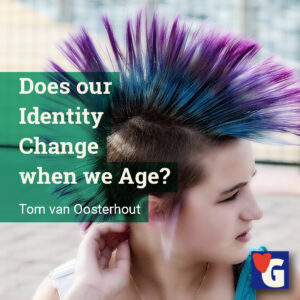
Does our identity change when we age? Why is this a relevant question? The sympathetic Belgian psychiatrist Paul Verhaeghe is very precise about this (from his book The end of psychotherapy): “Without identity, we are no more than our body.”
What is the core of our identity? What makes our identity so important? The answer Verhaeghe gives is very surprising: we have an identity because we share an enormous amount of human traits with other humans. The Latin identitas means similarity.
Some of the links might be affiliate links. As an affiliate associate, we earn a small commission when you purchase any of the products offered through the shared links at no extra cost for you. This helps us to maintain this website.
Table of contents
Identitas
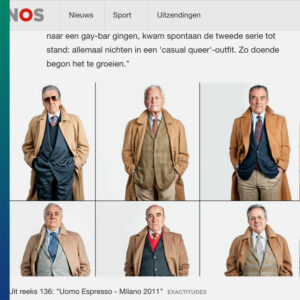
We share our identity with the group, with the many groups, to which we belong. We belong to these groups because we share the same symbolic expressions. Assisted by those symbols our identity nurses self-awareness, stability and continuity. That’s why it is so important.
Identity is the comforting feeling to be part of a group to which one is more or less identical. To be able to experience this feeling of similarity we must recognize, acknowledge, reproduce and demonstrate the symbolic expressions that make up our identity.
We mirror, as it were, these symbolic expressions to the other members of the groups we participate in. Most of these expressions are shared meanings and values. The majority of the symbolic expressions refer to bodily functions: eating habits, clothes, kinship, gender, and physical interaction (talk, facial expressions).
Shifting values
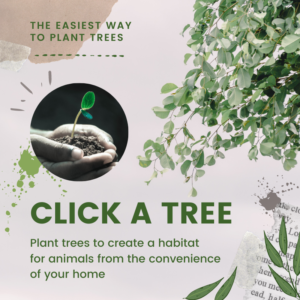
The values we share with others are, for instance: (self) respect and discipline, freedom, security, a sense of belonging, politeness, a world at peace, social justice, and equality. When we grow older the balance of our values shifts.
Young people (< 50) value power, being ambitious, stimulation, hedonism, and self-cultivation. The elderly (> 50) value tradition, conformity, security, universalism, and reciprocity. The elderly value social belonging. The young are more individual-oriented. This signifies identities change when we age.
Both age groups, though, share the need for self-development. Besides, the elderly actively mirror their ideals with those of young people and with the time when they were still young themselves and had a job. This signifies some of our identity remains the same throughout life.
Forever young?
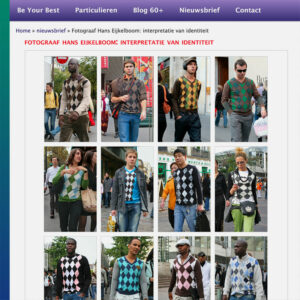
Mistakes are easily made when it comes to identity. In his book Forever young. The ‘Teen-Aging’ of Modern Culture, Marcel Danesi laments continuously about his idea that our contemporary world dictates “adolescent aesthetics and lifestyles as the aesthetics and lifestyles of all.” He assumes that the adult’s identity is dominated by ‘teen-aging’.
Unfortunately, his conception of identity is wrong. When you’re 80, to Danesi’s judgment, you’re not allowed to fancy the Cream or The Eagles or Adele (popular musicians), over Mozart’s Requiem or Beethoven’s 9th Symphony. Although I’m not 80 yet, I’ve long passed the adolescent age.
My problem is that I like all of the mentioned musicians, including the classical ones, and many more. What to think of modern classical composers, such as John Adams, Steve Reich, Philip Glass, Arvo Pärt, Gorecki etc.?
Our identity is the path we take

The path we take defines our identity. This is why Danesi is wrong. In our adolescent lives, we were brought up with jazz, country, rock & roll and pop music and with classical music and folk music. We are defined by our past experiences, the groups we belonged to in the past, as well as by our present experiences and the groups in which we participate today.
Besides music, this is also expressed in the clothes we wear. When we were young we wore jeans and t-shirts. Because we liked them, they made us feel part of the group we wanted to belong to and they were easy to wear.
As a working adult, every day I had to wear a suit and a necktie. At present, I hardly ever wear a suit, let alone a necktie. The clothes I now wear resemble those of my adolescence, because they make living easier.
At the same time, nowadays, almost all elderly have a mobile phone and a computer or a laptop. Hannie and I have them all and we both also have an i-pad and a Kobo reader. How about that for an identity?
Does our identity change when we age?
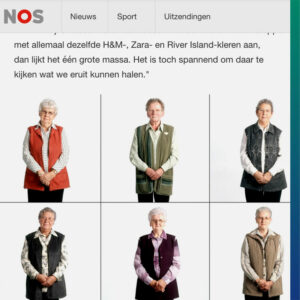
In the Seventies of the last century, almost all generations accepted, from one day to the other, hedonism as their guiding principle. To be happy in the here and now was accepted by almost anybody, even by many of the oldest. Who could blame us?
The universal adaptation of hedonism is the best proof of the possibility that our identity changes when we age. However, our identity does not always change in the direction some of us would like it to change, as with Danesi.
I know men and women who, despite a wild youth, cannot say goodbye to their suits, neckties and pleated skirts. That is all in line with the idea of hedonism. We choose what we like ourselves. As a consequence, there are vast identity differences within and between generations, as there are substantial similarities. This is what makes life and humans interesting.
Neuropeptides

Everybody wants to bond. There’s no escaping. It’s a biological thing. Neurotransmitters, such as oxytocin, vasopressin and dopamine, stimulate our need to belong, our need to bond with others, and our need for caregiving and partner bonding.
Given these universal and unavoidable needs, it still is a big surprise that we nurture such different identities. This is, at the same time, a comforting idea because this means that the chemical factory I consider our body to be, also carries the possibility to change our identity.
We can change our identity, whenever we want to
This ability, our ability to change our identity, gives hope to those who wish to change their identity. Like we did.
We moved to Spain. Drastically changed our eating habits. Developed a more programmatic exercise to keep our bodies in shape. Did not lose sight of our friends.
And we started AGE with CARE, to share our idea that growing old is not an identity, it’s as much a time of discovery, challenge and happiness as growing up.
How would you define your identity? Let us know in the comment box.
Related: Make a Daily Intention – Happiness is Living on Purpose

Hi Tom
This is so interesting and very timely for me. I have just finished a ‘Become your Future Self’ Course by Benjamin Hardy PHd and was so inspired am now reading his book, Personality isn’t Permanent. The idea behind both of these is that we can choose who we want to be. Most people don’t because they don’t realise they can.
They are stuck mostly in their past perhaps blaming others and theirselves for mistakes their former selves made and thinking that the sort of person they are (e.g. introvert) means that certain paths are unavailable to them which is not true.
You form a new identity by working towards the goals you want to achieve and focus on who you need to become in a very deliberate way to achieve these goals. This sounds like exactly what you and Hannie did. You made a decision to move to Spain and change your lives. I bet you are both quite different now, but your shared vision has kept you growing in the same direction (fortunately!).
Kind regards,
Jean
P.S. I saw the Eagles live in Glasgow last year – they were AMAZING!
Hi Jean,
Thank you for your compliments and your info.
You’re right in discarding path-dependency as an identifier and in pointing at the significance of goals, focus and consciousness.
To be conscious of what you do is important because there is much of yourself that is unconsciously directing your identity, and there are many things in your environment you have to cope with or comply to. Don’t shy away of what is distracting, face it, love it and go you’re own way.
Kind regards,
Tom
Hi Tom,
What a fascinating subject to write about, plus I really wasn’t sure what direction you were going to take this in.
However, I’m glad to say that your final thoughts about our identity pretty much mirrors my own.
I think you’ve hit the nail of the head by saying that there are vast identity differences within and between generations, as well as many similarities.
I know a couple of well-known sayings that give us a clue that we can’t stereotype something as important as identity to each generation – “Old before your time” and “Will you ever grow up”.
Believe it or not, I’ve had both said to me.
For me, my identity has remained much the same throughout my life, although how I interpret things, especially the actions of others, may have changed.
I sometimes look back on my “wild” younger days and shake my head when I see youngsters acting in the exact same way now – very hypocritical of me.
So, yes in some ways my values have changed, but I still believe I’m not so much different from many years ago.
With that said, I am still in the under 50 category, but fast approaching it, so let’s see how I view a subject like this in say, 10 years time.
LOL, who knows what I may think then.
A wonderful read as always Tom.
Partha
Hi Partha,
Good that you weren’t sure which direction I was going. Personally I prefer it when a text gets me off guard.
Thank you for your compliments too.
You also touch on some very interesting aspect of our identity. Who are we? Are we our behavior? Are we our values? Are we the words we share with others? Or are we what others think we are? Or what they see we do? Or what they hear we say?
Is identity something we want or something we have? Or both taken together? Is it what we did and thought when we were young or is it only what we do and think in the moment? Is our identity something static or fluid?
Somewhere I’ve written down some thoughts about all these questions. I think it’s time to recover these thoughts and publish them again.
Thank for your comments Partha, made my thoughts spin again,
Tom
Hey Hannie,
This is such an inspirational article. I completely agree that it is all down to us to change our identity if we want to. When I was in my teens and early twenties, I wanted to be Eddie Van Halen. I wanted to be a rock star so much that I worked on my guitar playing, songwriting and band rehearsals every day. I listened to all the new music, learned about record labels, managers and everything you needed to become a rock star. I almost did become one too.
Then, when I was in my early 30’s (5 years ago) I started focusing on something different. I didn’t want to identify as a rock star anymore. I wanted to identify as a leader and someone who can help others become leaders.
So, I agree that if you want to change your identity then go for it.
All the best,
Tom
Hi Tom,
Having the same name is confusing. So I don’t mind you addressing Hannie. Besides, Hannie and I share the same life. Although we most certainly are not identical. ‘Au contraire’, as the French say.
Thank you for your compliments.
Eddie van Halen? I’m ashamed to say that I had to consult gloogle to find out who he is. O, excuse me, ‘who he was’. He just died a couple of weeks ago. That was perhaps hard on you. Even though you lost your appetite for a rock star career, I presume you still have a soft spot for him and rock music.
He was born in Amsterdam! That makes me feel ashamed even more. Although after having listened to some of his music, he was a wizard on the guitar, I have to excuse myself for not being a fan. I don’t like the music.
If it comes to music I must admit, I have an idiosyncratic taste. Besides, when reading, something I do a lot, almost every type of music distracts me. That’s not because I don’t like listening to music, I think it’s because I like music too much. As I said it distracts me. I can’t get my mind of it. The lyrics always absorb my ears. Music, the music I like, gets me in a relaxing mood. And reading is all but relaxing. At least for me.
Back to your change of identity. I wonder, was it really such a big change? Many rockstars, as you probably experienced even more than most of us, are role models. In this capacity they are ‘leaders’ as well. They inspire with their music. They inspire with their behavior. They inspire with their ideas and values. Of course, many rockstars geared of track and are role models in this as well. But show me the leader who is perfect. If they all were, you should be out of work pretty soon.
Have a nice day and a prosperous career,
Tom
Hi Tom,
This is interesting. Talking about identity, I never would have thought I would become what I’am today.
I agree with you we can be change our identity whenever we want to.
20 years ago, I wouldn’t have agreed to this statement. I always want to be the hip and cool individual. I never want to mellow down. Not in a million years, said 15 year old me! *chuckle*
My goal was to be the coolest young mom. That did not went as planned. Our perspectives changed as we grow older. We grow, we learn. My aim is to learn more new things, the more I age.
I really enjoy reading your posts. It does open up my mind to view old age as something exciting.
Thanks for the good read!
Hi Ina,
Thank you for your compliments. Boosts the ego.
The interesting thing is that when you get older you’ll notice that every age has its exciting challenges.
The hip and cool 15 year old learns to stand on her or his own legs. To find out at the age of 30 this was only meant to get ready for the big evolutionary challenge of reproducing our species.
When I explain this, some call me a cynic. However, to me this is the opposite of cynical. To be part of something so exciting and challenging as the evolution of our species and to understand what this means for us personally, is all but cynical. It’s breathtaking.
Fortunately, at 15 we’re hardly aware of such mind blowing perspectives. Such perspectives come when you’re old enough to have the time and the patience to look back on your life.
It’s the same with our identity. Often only in hindsight we’re aware of any identity change. Probably many people are never aware how such changes define their life. And how fortunate such changes are. Because it’s exactly as you observed: “We grow, we learn.” That’s where identity is all about.
Thank you for your comment. Be the change you wish to see in the world. (Ghandi).
Regards, Tom